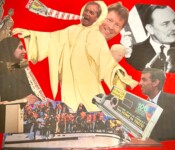Viewpoint – Europe: Overreaction to a right-wing Threat? A Q&A with Dan Hodges of Searchlight
Since the recession of 2008 there seems to be more than just financial issues at stake. The disillusionment with traditional politics has resulted in hung parliaments in Britain and in some countries in Europe.
The knock on effect of this lack of support has seen voters trying to find solutions. Some have even turned to the extreme right as the economic woes of countries are blamed on scapegoats through xenophobia and Islamiphobia.
Right wing democratic governments in Germany, Britain and France have spoken about the failures of the multicultural ‘experiments’ in their countries. Is history repeating itself and could the realities of a pattern of another recession that of 1929 and the extreme right wing support that rose up due to that be returning to this region? Or does it seem larger than what it is due to constant mention of these elements in the mass media at one time? Synchronicity Magazine spoke to Daniel Hodges a communications consultant for Searchlight, an organisation founded in 1962 that gathers information on the extreme right, about his take on the subject.
Q. I was interested in the connection between all the extreme right wing groups in Europe and their involvement with groups in the UK? Is there a strong solidarity between them all? I know for instance that last year some EDL members went to Amsterdam to join the Dutch Defence League in support of Geert Wilders in his trial. Yet Wilders said afterwards, contemptuously, that he didn’t know anything about them or invite them?
A. There’s been some very close liaisons. During the Luton demonstration senior far right activists from Germany, Sweden and France attended the rally and stayed overnight in the local Hilton hotel. They did go out to Amsterdam but were ambushed by European anti-fascist activists. They [EDL] are less political than their European counterparts but some of the more senior EDL players see attractions to building on the model of their European far right counterparts.
Q. As history seems to repeat itself do you think that it is a possibility that the world might be going through another 1929 stock market crash scenario and the rise of extremities in Europe? Examples like: Then and with our recession today more people are becoming disillusioned with traditional politics that got them into the economic mess as extreme right wing parties are gaining more support in this climate of austerity due to finding scapegoats?
A. There is no room for complacency and the strength of the far right on mainland Europe is troubling. But look at it another way; in the UK we’ve experienced the ‘perfect storm’ for the extremists. Financial, crash, recession, Labour party deeply unpopular, Tories unable to properly capitalise, immigration at the top of the political agenda, the expenses scandal, etc… And yet the BNP is imploding and the EDL is turning in on itself. If they [anti-fascist groups] are vigilant and organise they can hold the line.
Q. Can it become that extreme again like in the 1930’s? Examples like: Marine Le Pen is gaining more support and even so-called “moderate” right-wing politicians like Sarkozy expelled the Roma Gypsies from France without any protests. He [Sarkozy] is also rumoured to be adopting more extreme xenophobic policies, which he seems to have no scruples about, so as to make sure that he doesn’t lose support to Marine Le Pen in the forthcoming elections.
A. What’s reassuring is that all the major political parties are now addressing issues like immigration and national identity, but in a relatively restrained way. During the election immigration featured prominently but none of the major parties played the race card. We’ve had British jobs for British workers under Brown and Cameron’s Munich speech, but they are isolated rather than part of a coherent strategy to exploit tensions. What is required though is for politicians of all persuasions to face up to the issues of identity, nationality and loss of a sense of community that provide the breeding ground for extremism.


























